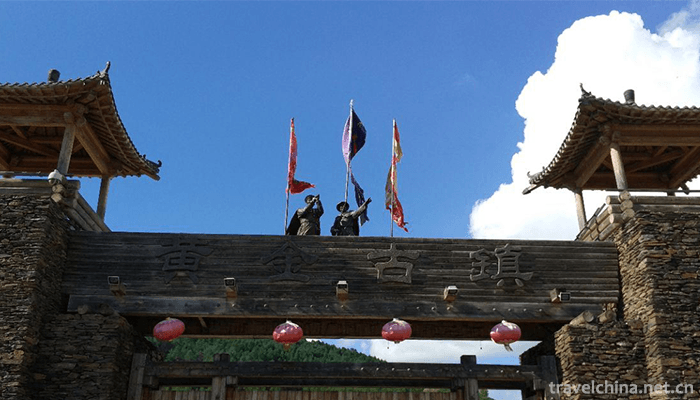Taipinggou Golden Town
The scenic spot of Taipinggou Gold Town is based on the history of gold mining in Taipinggou in late Qing Dynasty. It deeply excavates the historical culture and characteristic tourism resources. It shows the development process of gold mining in Taipinggou from the middle of eighteenth century to the end of the twentieth century, around two hundred and fifty years. The scenic spot covers an area of 250,000 square meters and a building area of 12,000 square meters. The scenic area is divided into three parts: Golden Old Town Resort, Kowloon Cultural Square and Gold Rush Experience Area. It has many functions, such as historical and cultural exhibition, tourism, catering and accommodation, leisure and entertainment, gold rush experience, cultural performance, film and television shooting, etc.
geographical position
Golden Town of Taipinggou Village, Taipinggou Township, Luobei County, Hegang City, Heilongjiang Province
Tour in ancient town
The Golden Old Town Resort has three characteristic historical and cultural exhibition halls, including gold mining history, northern sex culture, tobacco hall and gambling house. Some bronze sculptures in the resort vividly reflect people's lives during the gold rush period.
The water recreation project has a large high-speed yacht with a cost of 17 million yuan to visit the scenery of the Three Gorges of the Longjiang River. Experience different thrills and excitement in the natural landscape.
Longdingshan Tourist Platform can be reached by hiking for an hour from the ancient town, which provides a good view for tourists. Upon this tower, the Yangtze River will surge and the scenery will be full of panoramic views.
Playing in ancient town
There are entertainment centers in the town, including billiards hall, chess and card room, cinema and KTV. Ancient barbecue deduction square accepts customized bonfire party.
Eat in ancient town
Ancient town catering is divided into Guandong restaurant, Longjiang first place pot fish, characteristic barbecue. In Guandong Hotel, you can enjoy the delicious mountain game. In the first place of Longjiang, you can taste the pure wild fish of Heilongjiang River. You can enjoy the authentic Northeast Barbecue in the special barbecue.
Living in ancient town
There are special rooms with wooden roofs and tiled roofs in the ancient town for you to stay in. The early morning of the ancient town begins with the ancient wooden house. Looking out from the window, we can see the early morning forest. Some light mist has not yet been dispersed. It looks like a fairy's dancing veil from a distance. The peaks on both sides of the Taiwan Strait are tall and colorful, and the rivers are flowing with blue waves. Old town night away from the lights and noise of the city, accompanied by the bright moon and the stars in the sky, strolling along the forest path, you can enjoy the unique quiet and ease in the mountains and forests, night small garden grass and forest insects trivial night talk will be the best hypnotic song.

0 Questions
Ask a Question
Your email address will not be published.